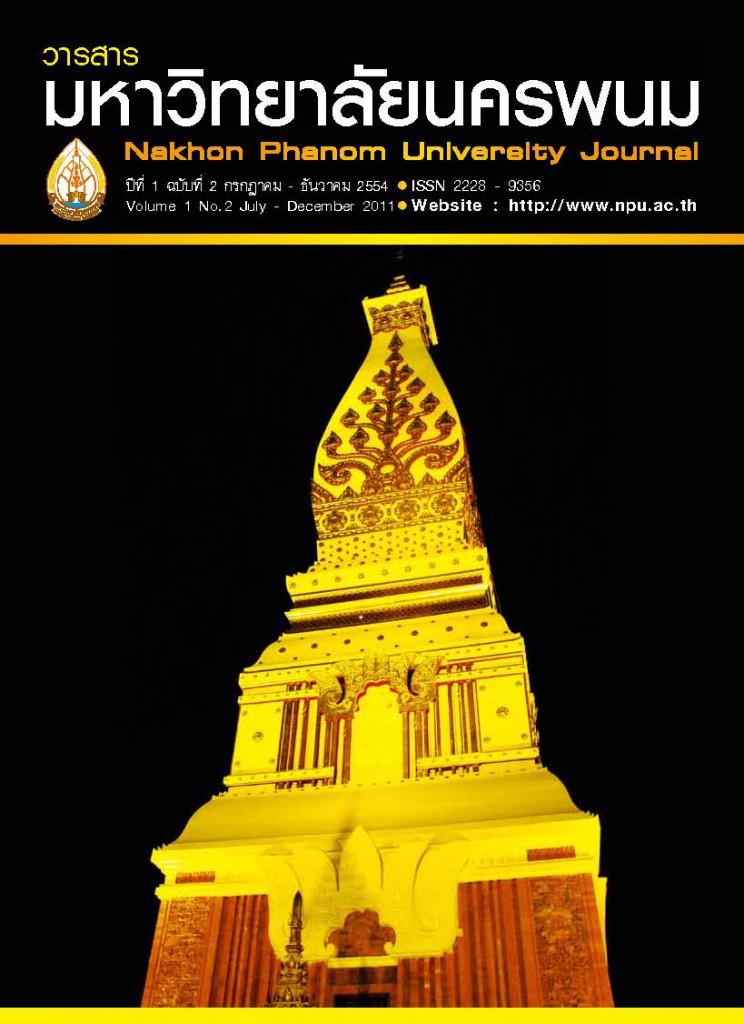สภาพและปัญหาการบริหารโดยใช้โรงเรียนเป็นฐาน ของผู้บริหารโรงเรียน สังกัดเทศบาลเมืองนครพนม
Main Article Content
Abstract
บทคัดย่อ
การวิจัยครั้งนี้มีวัตถุประสงค์เพื่อศึกษาสภาพและปัญหาการบริหารโดยใช้โรงเรียนเป็นฐาน ของผู้บริหารโรงเรียน สังกัดเทศบาลเมืองนครพนม เพื่อเปรียบเทียบความคิดเห็นต่อสภาพและปัญหาการบริหารโดยใช้โรงเรียนเป็นฐานของผู้บริหารครูและคณะกรรมการสถานศึกษาขั้นพื้นฐาน และเพื่อเสนอแนวทางการพัฒนาการบริหารโดยใช้โรงเรียนเป็นฐานของผู้บริหารโรงเรียนสังกัดเทศบาลเมืองนครพนม ประชากรในการวิจัยครั้งนี้ ประกอบด้วยผู้บริหาร 25 คน ครู 163 คน และคณะกรรมการสถานศึกษาขั้นพื้นฐาน จำนวน 78 คน รวมประชากร 266 คน กลุ่มตัวอย่างที่ใช้ในการวิจัย จำนวน 164 คน ได้มาโดยวิธีการสุ่มแบบหลายขั้นตอน ประกอบด้วยผู้บริหาร 25 คน ครู 83 คน และคณะกรรมการสถานศึกษาขั้นพื้นฐาน จำนวน 56 คน เครื่องมือที่ใช้ในการเก็บรวบรวมข้อมูลเป็นแบบสอบถามชนิดมาตราส่วนประมาณค่า มีค่าความเชื่อมั่นสภาพการบริหารโดยใช้โรงเรียนเป็นฐาน เท่ากับ 0.93 และค่าความเชื่อมั่นปัญหาการบริหารโดยใช้โรงเรียนเป็นฐาน เท่ากับ 0.92 วิเคราะห์ข้อมูลโดยใช้โปรแกรมคอมพิวเตอร์สำเร็จรูป สถิติที่ใช้ในการวิเคราะห์ข้อมูล ได้แก่ ค่าร้อยละ ค่าเฉลี่ย ค่าความเบี่ยงเบนมาตรฐาน และการทดสอบค่าเอฟ ชนิดการวิเคราะห์ความแปรปรวนทางเดียว ผลการวิจัยพบว่า 1) ผู้บริหารโรงเรียนสังกัดเทศบาลเมืองนครพนมใช้การบริหารฐานโรงเรียนอยู่ในระดับมาก 2) ผู้บริหารโรงเรียน มีปัญหาการบริหารฐานโรงเรียนอยู่ในระดับปานกลาง 3)ผู้บริหาร ครูผู้สอน และคณะกรรมการสถานศึกษาขั้นพื้นฐาน มีความคิดเห็นต่อสภาพการบริหารโดยใช้โรงเรียนเป็นฐานของผู้บริหารโรงเรียนสังกัดเทศบาลเมืองนครพนม โดยรวมแตกต่างกัน อย่างไม่มีนัยสำคัญทางสถิติ 4) ผู้บริหาร ครูผู้สอน และคณะกรรมการสถานศึกษาขั้นพื้นฐานมีความคิดเห็นต่อปัญหาการบริหารโดยใช้โรงเรียนเป็นฐานของผู้บริหารโรงเรียนสังกัดเทศบาลเมืองนครพนม โดยรวมแตกต่างกัน อย่างไม่มีนัยสำคัญทางสถิติ 5) ผู้บริหารโรงเรียนสังกัดเทศบาลเมืองนครพนม ควรใช้หลัก 4 ด้าน คือ ด้านหลักการมีส่วนร่วม ด้านหลักการคืนอำนาจจัดการศึกษาให้ประชาชน ด้านหลักการบริหารตนเองและด้านหลักการตรวจสอบ และถ่วงดุล ในการบริหารฐานโรงเรียน
ABSTRACT
The purposes of this research were to study the states and problems of the school–based management of theadministrators under Muang Nakhon Phanom Municipality, to compare the opinions of the administrators, teachers and basic school board members towards the states and problems of the school-based management, and to suggest guidelines for developing the school-based management of the administrators under Muang Nakhon Phanom Municipality. The population involved 266 people comprising 25 administrators,163 teachers and 78 basic school board members. The sample group of 164 subjects gained by multi-stage random sampling consisted of 25 administrators, 83 teachers and 56 basic school board members. The instrument used to collect the data was a rating scale questionnaire comprising 2 parts. The first part was about the state of the school-based management with the reliability of 0.93. The second part was about the problems of the school-based management with the reliability of 0.92. The data were analyzed using a computer software package. The statistics used for the data analysis were ทpercentages, means, standard deviations, and F-test (One-way ANOVA). The results of this research were as follows: 1) The school administrators under Muang Nakhon Phanom Municipality used the school-based management at a high level. 2) The school administrators had problems with the school-based management at a moderate level.3) The overall opinions of the administrators, teachers and basic school board members towards the states of theschool-based management of the school administrators under Muang Nakhon Phanom Municipality showed no statistically significant difference. 4) The overall opinions of the administrators, teachers and school board members towards the problems of using the school-based management by the school administrators under Muang Nakhon Phanom Municipality showed no statistically significant difference. 5) It was suggested in the guidelines that the school administrators under Muang Nakhon Phanom Municipality should use the following 4 aspects for the school-based management: the principles of participation, the principles of empowering education for people, the principles of self-administration and the principles of checks and balances.


